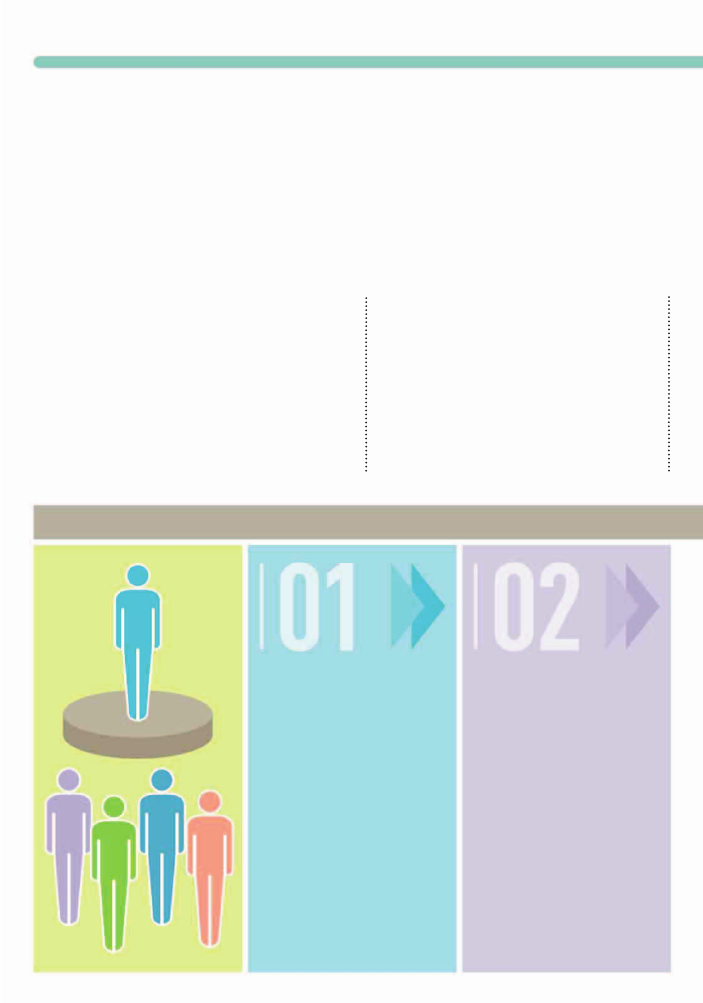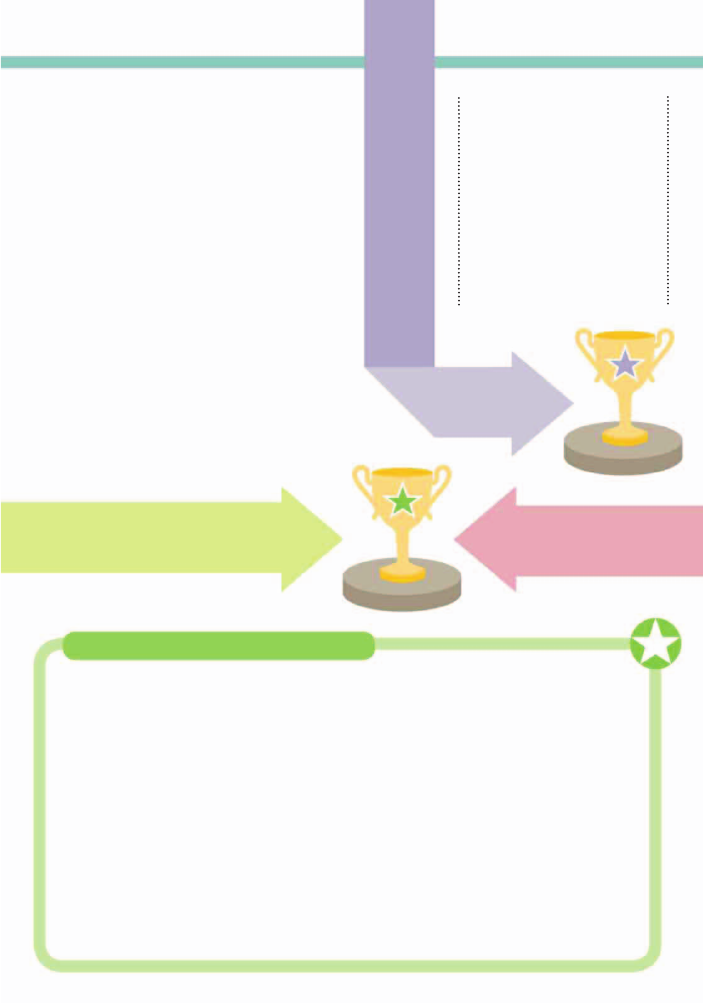
62 / MANAGING A TEAM
Maslow’s hierarchy of needs
SAFETY
NEEDS
Once physiological
needs are satisfied,
safety needs are
aroused. These can
be satisfied at work
by having job security
and safe working
conditions, and
receiving medical
benefits.
PHYSIOLOGICAL
NEEDS
Our most basic
needs are for physical
survival, such as to
satisfy hunger or thirst.
At work, this is receiving
enough pay to buy food
and clothing and pay
the rent.
Motivating others
Understanding needs
As a manager, you need to understand
what drives your team to do the best
that they can. American psychologist
Abraham Maslow proposed that every
individual has a five-level hierarchy of
needs that they are driven to attempt
to satisfy. After a lower-level need has
been largely satisfied, its impact on
Every day, people make decisions about how much effort to put into their
work. Managers have many opportunities to influence these decisions
and motivate their team by providing challenging work, recognizing
outstanding performance, allowing participation in decisions that
affect employees, and showing concern for personal issues.
Ability is the product of
aptitude, training, and
resources, while motivation
is the product of desire and
commitment; all are required
for high performance levels

MOTIVATING OTHERS / 63
SELF
ACTUALIZATION
NEEDS
The highest level is
to feel that we are
achieving life goals.
At work, this means
being able to exercise
creativity and to
develop and fully
utilize our skills.
ESTEEM NEEDS
Next, we are motivated
by the need for
self-esteem and
esteem from others,
such as recognition
for accomplishments
and promotion.
SOCIAL NEEDS
Once you feel
reasonably secure,
social needs begin
to take over. At work,
this means having
good relationships
with coworkers and
participating in company
social functions.
behavior diminishes, and a person
may begin to be motivated to gain
the next highest level need.
There are two aspects to what
makes a person perform well: ability
and motivation. Ability is the product
of aptitude, training, and resources,
while motivation is the product of
desire and commitment. All of these
elements are required for high
performance levels. If someone is
not performing well, the first question
you should ask yourself is: “Is this
person’s poor performance the
result of a lack of ability or a lack of
motivation?” Motivational methods can
often be very effective for improving
performance, but if the problem is lack
of ability, no amount of pressure or
encouragement will help. What the
person needs is training, additional
resources, or a different job.
of people are motivated by doing a
meaningful job compared to 25%
who are primarily motivated by money
29%

64 / MANAGING A TEAM
Using positive reinforcement
Rewarding progress and success
and recognizing achievements are
powerful ways to motivate your team.
By rewarding someone for doing
something right, you positively reinforce
that behavior, providing an incentive for
doing it again. There are two basic types
of reward: extrinsic and intrinsic. Many
people depend on and highly value
extrinsic rewards that are externally
bestowed, such as praise, a promotion,
or a pay raise. Others place a high value
on intrinsic rewards, which originate
from their own personal feelings about
how they performed or the satisfaction
that they derive from a job well done.
CASE STUDY
PRIORITIZING NEEDS
Theresa, a successful technical
writer and a single parent,
had been earning a good salary
and benefits that enabled her to
provide for her family’s physical
well-being: ample food,
comfortable housing and
clothing, and good medical care.
Her company then announced
that it was downsizing, and she
feared being laid off. This triggered
concerns about her safety needs
and meant that she became much
less concerned about the higher
order needs of belonging to a
group or her own self-esteem to
perform creative and technically
accurate work. Rather, she
was motivated to do whatever was
necessary to ensure that she kept
her job or could find a new one.
Once Theresa knew that her job
was safe, she changed back to
having a higher-order need,
energizing her behavior.
Many depend
on extrinsic
rewards that
are externally
bestowed, such as
praise, a promotion,
or a pay raise

MOTIVATING OTHERS / 65
Rewarding success
Try to understand whether each individual
you are managing values intrinsic or
extrinsic rewards more highly. If you
always praise achievements, for example,
a motivated person who excels largely for
the feelings of intrinsic satisfaction will
probably begin to view you as superficial.
The professional may think, “I know I did
a superb job on this project. Why is my
manager being so condescending?”
People also desire different types of
extrinsic rewards. Praise may be perfectly
acceptable to the person motivated by
affiliation and relationship needs, but
may do nothing for the person expecting
a more tangible reward, like money.
Typical extrinsic rewards are favorable
assignments, trips to desirable destinations,
tuition reimbursement, pay raises, bonuses,
promotions, and office placements.
ASK YOURSELF…
YES NOCan I draw on my experience?
1 Can you think of a coach, teacher, or manager who motivated
you to enhance your performance in a particular task? ...............
2 Can you pinpoint what this person did to motivate you? ................
3 Can you remember how you felt as a result? ..................................
4 Can you recreate these actions or use the same approach
when trying to motivate your team? ................................................

66 / MANAGING A TEAM
Motivating your team
GIVING PERFORMANCE FEEDBACK
Provide feedback to demonstrate that you know what the
members of your team are doing and to acknowledge
improved performance or a job well done. Especially
when individuals are unsure of themselves, you
should point out ways in which the person is improving.
Praising specific accomplishments will help bolster
that person’s self-esteem.
STRENGTHENING EFFORTPERFORMANCE
REWARD EXPECTANCIES
To get the best from your team, emphasize the anticipated
reward value, whether extrinsic or intrinsic. Make sure that
every individual realizes the link between their performance
and the rewards. Even if your organization does not provide
performance-based pay, you can bestow other extrinsic
rewards, such as allocating more favorable job assignments.
..................Content has been hidden....................
You can't read the all page of ebook, please click here login for view all page.
